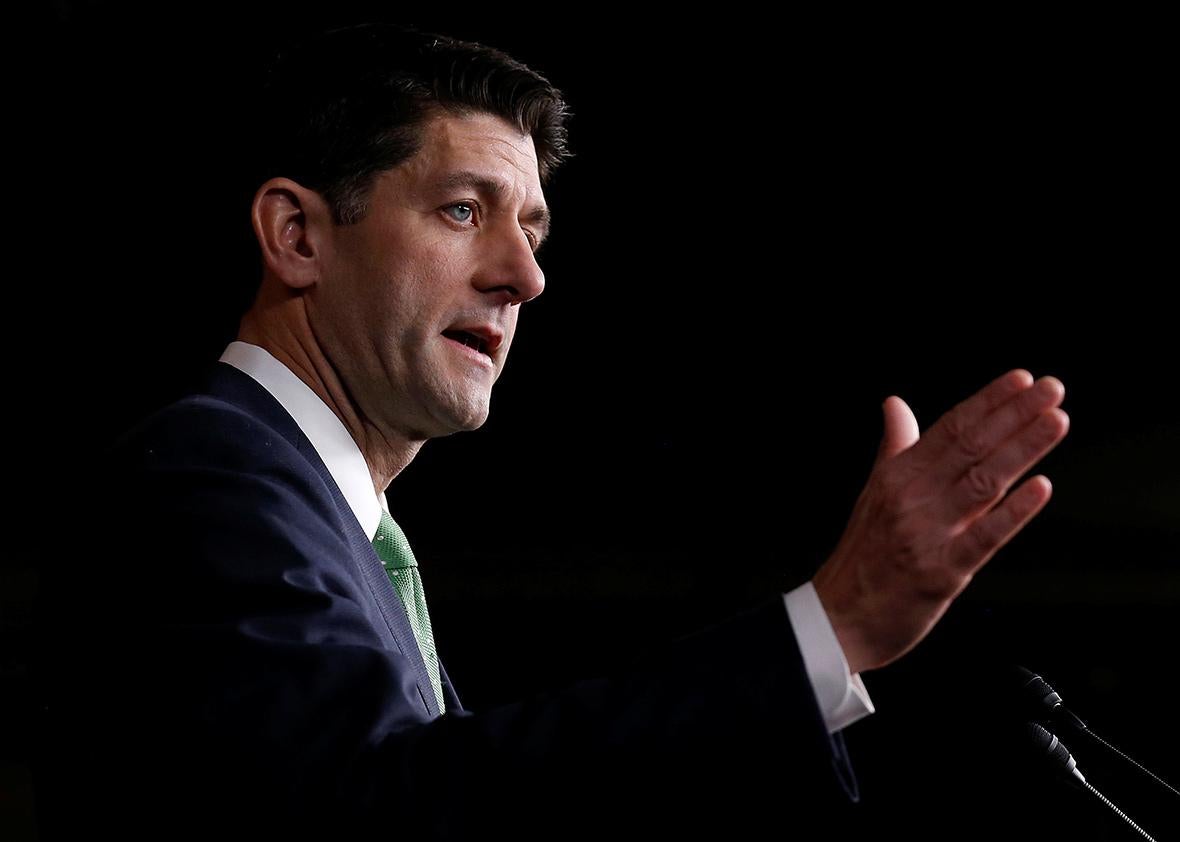After Republicans smashed Democrats in the 2010 midterm elections, taking the House of Representatives after four years in the minority, a chastened Barack Obama used his 2011 State of the Union to reach out to the GOP on what appeared to be the party’s major concern. “We are living with a legacy of deficit spending that began almost a decade ago. Now that the worst of the recession is over, we have to confront the fact that our government spends more than it takes in. That is not sustainable,” said Obama, concluding with a nod to conservative rhetoric. “Every day, families sacrifice to live within their means. They deserve a government that does the same.”
Obama and other moderate Democrats believed that Republicans—and Republican voters—actually cared about “fiscal responsibility.” It’s why, in that address, Obama proposed a five-year domestic spending freeze. It’s also why he risked the ire of his base to pursue a “grand bargain” for debt reduction with then–House Speaker John Boehner, offering to trade cuts to Medicare and Social Security for tax hikes on the wealthy. Negotiations went far, but the bargain was scuttled—not by Democrats, but by conservatives in the House of Representatives.
It was a stark example of an age-old truth in budgetary politics: Republicans don’t actually care about debt or deficits.
The party tries to project an image of fiscal responsibility, but only when Democrats are in power and they can blast their opponents as “tax and spend” liberals. In 2009, as the recession drove the global economy to the brink of collapse, Republican lawmakers excoriated President Obama for spending nearly $800 billion on a much-needed stimulus package. “Yesterday the Senate cast one of the most expensive votes in history,” said Sen. Mitch McConnell at the time. “Americans are wondering how we’re going to pay for all this.”
During the 2012 presidential election, Mitt Romney and running mate Paul Ryan repeatedly hit the Obama administration on debt and deficits. In his acceptance speech at the Republican National Convention, Romney said Obama’s “trillion-dollar deficits will slow our economy, restrain employment, and cause wages to stall.” Ryan had an even starker view: “In this generation, a defining responsibility of government is to steer our nation clear of a debt crisis while there is still time.”
Once in power, however, Republicans always reverse course. Rep. Ryan’s career is instructive in this regard. During the eight years of the George W. Bush administration, Ryan backed both of the president’s tax cuts and both of his wars—budget-busting endeavors that added to the nation’s structural deficits and drove debt growth for the next 10 years. Under Obama, he switched gears, warning darkly of future crises. But now that he holds the speakership under a Republican president with a Republican Senate, he’s reverted to Bush-era form. Ryan is the driving force behind the party’s tax agenda, which balloons the deficit in both bills passed by the House and the Senate.
Those bills, which cut taxes for corporations, high-earners, and the heirs to wealthy estates, are slated to add $1 trillion to the debt. And that’s a best-case scenario derived from Republican assumptions about the dynamic effects of tax cuts. If those effects don’t pan out, then the impact on debt and deficits will be even larger. When pressed on this, Republican lawmakers simply deny it, arguing against all evidence that their tax cut will actually increase revenues. “Economic growth produces more revenue and that will help to offset this tax cut and actually lower the debt,” said Susan Collins of Maine, one of the more moderate members of the Senate Republican Caucus.
Overall, Republican administrations have been responsible for most debt accumulation over the past 40 years. At every opportunity, they cut taxes and damage the government’s ability to collect revenue, using the inevitable shortfalls to then justify spending cuts.
For Democrats, the only way to win this game is not to play, to recognize that Republican calls for “fiscal responsibility” are made in bad faith, and understand that conservatives will rebuff their overtures on debt reduction. The upshot is that Democrats will cease suffering the self-inflicted wounds that come with taking Republicans at their word. The stimulus package, for example, was hundreds of billions of dollars smaller than it should have been, a choice Democrats made to appease conservative Blue Dog Democrats. Republicans rejected the bill outright and instead of winning credit for their fiscal propriety, the Blue Dogs were wiped out in the midterm elections. Indeed, by sacrificing hundreds of billions in needed stimulus on the altar of deficit reduction, Democrats likely consigned the country to a slower recovery, harming their political prospects and likely contributing to their 2010 wipeout.
Similarly, Democrats built the Affordable Care Act with deficits in mind, making subsidies less generous to win moderate, and perhaps even GOP, support. What happened instead was that Republicans spent the next seven years demagoguing the law, culminating in a concerted effort to repeal as much of it as possible. And the law’s stingier support for middle-income families (coupled with the Supreme Court’s dismantling of the Medicaid expansion) has made it more difficult to defend politically, adding to Democratic troubles.
At some point, Democrats will again hold power in Washington, and Republicans will inevitably renew their cries of “fiscal responsibility.” Democrats should finally see that for what it is: a trap.
